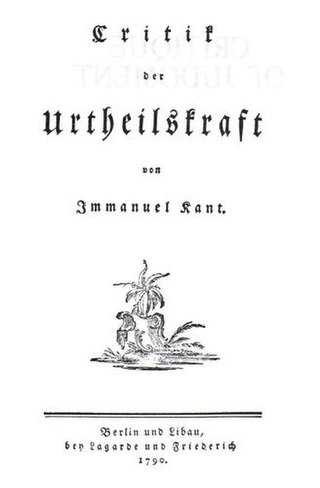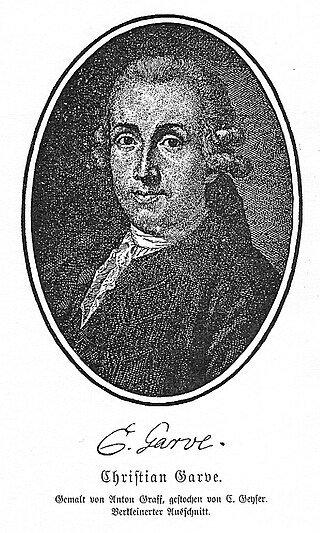
An Enquiry Concerning Human Understanding is a book by the Scottish empiricist philosopher David Hume, published in English in 1748. It was a revision of an earlier effort, Hume's A Treatise of Human Nature, published anonymously in London in 1739–40. Hume was disappointed with the reception of the Treatise, which "fell dead-born from the press," as he put it, and so tried again to disseminate his more developed ideas to the public by writing a shorter and more polemical work.

Immanuel Kant was a German philosopher and one of the central Enlightenment thinkers. Born in Königsberg, Kant's comprehensive and systematic works in epistemology, metaphysics, ethics, and aesthetics have made him one of the most influential and controversial figures in modern Western philosophy, being called the "father of modern ethics", "father of modern aesthetics" and, by bringing together rationalism and empiricism, the "father of modern philosophy".
Alexander Gottlieb Baumgarten was a German philosopher. He was a brother to theologian Siegmund Jakob Baumgarten (1706–1757).

The Critique of Pure Reason is a book by the German philosopher Immanuel Kant, in which the author seeks to determine the limits and scope of metaphysics. Also referred to as Kant's "First Critique", it was followed by his Critique of Practical Reason (1788) and Critique of Judgment (1790). In the preface to the first edition, Kant explains that by a "critique of pure reason" he means a critique "of the faculty of reason in general, in respect of all knowledge after which it may strive independently of all experience" and that he aims to reach a decision about "the possibility or impossibility of metaphysics". The term "critique" is understood to mean a systematic analysis in this context, rather than the colloquial sense of the term.

Hume's fork, in epistemology, is a tenet elaborating upon British empiricist philosopher David Hume's emphatic, 1730s division between "relations of ideas" and "matters of fact." As phrased in Immanuel Kant's 1780s characterization of Hume's thesis, and furthered in the 1930s by the logical empiricists, Hume's fork asserts that all statements are exclusively either "analytic a priori" or "synthetic a posteriori," which, respectively, are universally true by mere definition or, however apparently probable, are unknowable without exact experience.

Transcendental idealism is a philosophical system founded by German philosopher Immanuel Kant in the 18th century. Kant's epistemological program is found throughout his Critique of Pure Reason (1781). By transcendental Kant means that his philosophical approach to knowledge transcends mere consideration of sensory evidence and requires an understanding of the mind's innate modes of processing that sensory evidence.

The Critique of Judgment, also translated as the Critique of the Power of Judgment, is a 1790 book by the German philosopher Immanuel Kant. Sometimes referred to as the "third critique", the Critique of Judgment follows the Critique of Pure Reason (1781) and the Critique of Practical Reason (1788).

On the Sublime is a Roman-era Greek work of literary criticism dated to the 1st century C.E. Its author is unknown, but is conventionally referred to as Longinus or Pseudo-Longinus. It is regarded as a classic work on aesthetics and the effects of good writing. The treatise highlights examples of good and bad writing from the previous millennium, focusing particularly on what may lead to the sublime.

In aesthetics, the sublime is the quality of greatness, whether physical, moral, intellectual, metaphysical, aesthetic, spiritual, or artistic. The term especially refers to a greatness beyond all possibility of calculation, measurement, or imitation.
This is an alphabetical index of articles about aesthetics.
"Critique of the Kantian philosophy" is a criticism Arthur Schopenhauer appended to the first volume of his The World as Will and Representation (1818). He wanted to show Immanuel Kant's errors so that Kant's merits would be appreciated and his achievements furthered.
This is a history of aesthetics.

In Kantian philosophy, a transcendental schema is the procedural rule by which a category or pure, non-empirical concept is associated with a sense impression. A private, subjective intuition is thereby discursively thought to be a representation of an external object. Transcendental schemata are supposedly produced by the imagination in relation to time.
Joseph Frank Rychlak was a psychologist well known for his work with theoretical and philosophical psychology. He developed a theoretical stance known as "Rigorous Humanism." This term refers to Rychlak's argument that psychology with ecological validity should be directed toward issues that are relevant to our lives.

On the Fourfold Root of the Principle of Sufficient Reason is an elaboration on the classical principle of sufficient reason, written by German philosopher Arthur Schopenhauer as his doctoral dissertation in 1813. The principle of sufficient reason is a powerful and controversial philosophical principle stipulating that everything must have a reason or cause. Schopenhauer revised and re-published it in 1847. The work articulated the centerpiece of many of Schopenhauer's arguments, and throughout his later works he consistently refers his readers to it as the necessary beginning point for a full understanding of his further writings.
A priori and a posteriori are Latin phrases used in philosophy to distinguish types of knowledge, justification, or argument by their reliance on experience. A priori knowledge is independent from any experience. Examples include mathematics, tautologies and deduction from pure reason. A posteriori knowledge depends on empirical evidence. Examples include most fields of science and aspects of personal knowledge.

Christian Garve was one of the best-known philosophers of the late Enlightenment along with Immanuel Kant and Moses Mendelssohn.
The sublime in literature refers to the use of language and description that excites the senses of the reader to a degree that exceeds the ordinary limits of that individual's capacities.

The digital sublime is the mythologization of the impact of computers and cyberspace on human experiences of time, space and power. It's also known as cyber sublime or algorithmic sublime. It is a philosophical conception of emotions that captivate the collective conscience with the emergence of these new technologies and the promises and predictions that emerge from them. These emotions are the awe, the astonishment, the rationality-subsuming glory, and the generally intense spiritual experience.
In philosophy, axiological ethics is concerned with the values by which people uphold ethical standards, and the investigation and development of theories of ethical behaviour. Axiological ethics investigates and questions what the intellectual bases for a system of values. Axiologic ethics explore the justifications for value systems, and examine if there exists an objective justification, beyond arbitrary personal preference, for the existence and practise of a given value system. Moreover, although axiological ethics are a subfield of Ethical philosophy, axiological investigation usually includes epistemology and the value theory.











